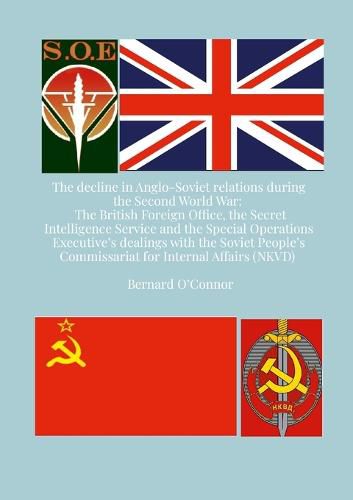Readings Newsletter
Become a Readings Member to make your shopping experience even easier.
Sign in or sign up for free!
You’re not far away from qualifying for FREE standard shipping within Australia
You’ve qualified for FREE standard shipping within Australia
The cart is loading…






This title is printed to order. This book may have been self-published. If so, we cannot guarantee the quality of the content. In the main most books will have gone through the editing process however some may not. We therefore suggest that you be aware of this before ordering this book. If in doubt check either the author or publisher’s details as we are unable to accept any returns unless they are faulty. Please contact us if you have any questions.
Britain allied with Russia and France during the First World War but the October Revolution in 1917, the Russian Civil War and the formation of the Union of Soviet Socialist Republics in 1922 led to a decline in diplomatic relations. Although the Soviet Union was allowed an embassy in London in 1924, the British Embassy in Moscow did not open until 1929. The economic depression during the 1930s was accompanied with widespread political disagreements. Left-wing opposition to right-wing policies led to demonstrations, strikes and in some cases violence. The more conservative political parties viewed the Communist Party as a threat. Although some countries made membership of a communist party illegal, the British conservative government instructed its Secret Intelligence Service (SIS) to collect information about its membership and activities and to identify and potentially defuse threats. Adolf Hitler's annexation of Austria and the Sudetenland in 1938 led Joseph Stalin to offer to move Soviet military forces to the German border to support France and Britain. As it would entail movement through Poland, the offer was refused. Fearing a Russian attack, Hitler ordered Joachim Ribbentrop, his Foreign Secretary, to meet Vyacheslav Molotov, the Soviet Foreign Secretary, and negotiate a ten-year peace deal with the Soviet Union. It included a secret agreement to divide Eastern Europe between them. Having invaded Norway, the Low Countries and France in June 1940, the German armed forces failed to invade Britain. Winston Churchill ordered the creation of the Special Operations Executive (SOE), a subversive intelligence organisation with a mission 'to set Europe ablaze by sabotage.' In June 1941 Hitler reneged on his agreement with the Soviet Union and ordered Operation Barbarossa, the Axis invasion of Russia. This prompted urgent meetings between Britain and the Soviet Union which led to a top-secret agreement between the two countries and their intelligence services having to collaborate for the first time. Bernard O'Connor's 'The decline of Anglo-Soviet relations during the Second World War' is a documentary history which uses previously classified files in the British National Archives and other sources to investigate the collaboration between the British Foreign Office, the SIS and the SOE with the Soviet intelligence service, the People's Commissariat for Internal Affairs (NKVD).
$9.00 standard shipping within Australia
FREE standard shipping within Australia for orders over $100.00
Express & International shipping calculated at checkout
This title is printed to order. This book may have been self-published. If so, we cannot guarantee the quality of the content. In the main most books will have gone through the editing process however some may not. We therefore suggest that you be aware of this before ordering this book. If in doubt check either the author or publisher’s details as we are unable to accept any returns unless they are faulty. Please contact us if you have any questions.
Britain allied with Russia and France during the First World War but the October Revolution in 1917, the Russian Civil War and the formation of the Union of Soviet Socialist Republics in 1922 led to a decline in diplomatic relations. Although the Soviet Union was allowed an embassy in London in 1924, the British Embassy in Moscow did not open until 1929. The economic depression during the 1930s was accompanied with widespread political disagreements. Left-wing opposition to right-wing policies led to demonstrations, strikes and in some cases violence. The more conservative political parties viewed the Communist Party as a threat. Although some countries made membership of a communist party illegal, the British conservative government instructed its Secret Intelligence Service (SIS) to collect information about its membership and activities and to identify and potentially defuse threats. Adolf Hitler's annexation of Austria and the Sudetenland in 1938 led Joseph Stalin to offer to move Soviet military forces to the German border to support France and Britain. As it would entail movement through Poland, the offer was refused. Fearing a Russian attack, Hitler ordered Joachim Ribbentrop, his Foreign Secretary, to meet Vyacheslav Molotov, the Soviet Foreign Secretary, and negotiate a ten-year peace deal with the Soviet Union. It included a secret agreement to divide Eastern Europe between them. Having invaded Norway, the Low Countries and France in June 1940, the German armed forces failed to invade Britain. Winston Churchill ordered the creation of the Special Operations Executive (SOE), a subversive intelligence organisation with a mission 'to set Europe ablaze by sabotage.' In June 1941 Hitler reneged on his agreement with the Soviet Union and ordered Operation Barbarossa, the Axis invasion of Russia. This prompted urgent meetings between Britain and the Soviet Union which led to a top-secret agreement between the two countries and their intelligence services having to collaborate for the first time. Bernard O'Connor's 'The decline of Anglo-Soviet relations during the Second World War' is a documentary history which uses previously classified files in the British National Archives and other sources to investigate the collaboration between the British Foreign Office, the SIS and the SOE with the Soviet intelligence service, the People's Commissariat for Internal Affairs (NKVD).